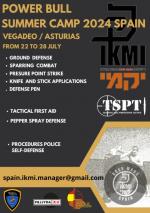Personal Defense Psychology
Why psychology?
Today, it is of strategic importance to know some psychological approaches and therefore some theories and applications relating to sport in general and to the practice of Krav-Maga in particular. Psychology, as a science of the soul, but above all as a behavioral science, is a key to some problems and situations that may be needed during the "peculiar" teaching of a discipline such as KRAV-MAGA.Mind and body should work in harmony especially when exercising an important and delicate job such as an instructor or trainer. Usually a well-trained body can "do much" but, "where the lion does not come ... comes the fox"!
In this perspective, we think that for a good instructor, it is essential, a psychological training. Psychological training means acquiring a some knowledge and mentalizing a range of skills that can be exercised during teaching activities but also during practice. Concepts such as personality, attitudes, temperament, personal dispositions, effectiveness, mantaining control ... always intervene in every human dynamics. Psychology serves to enrich, therefore, the personal and professional human baggage of all of us.
For this purpose, IKMI organizes in the Regions through its own representatives, monothematic courses on psychology as a useful instructor training tool. These courses are exclusively reserved for Ikmi instructors and instructors.
Psychology – Communication
Psychophysics: how the human body works under stress. It learns how the human body and mind react to stimuli. It is of particular interest to all security professionals.
General Psychology: what happens to the aggressor and the victim, how does our brain react to the body.
Social Psychology: the dynamics of groups.
Psychopathology: which disorders increase aggression, how to understand who is the person in front of us. The warning signs of an aggression.
Communication: efficiency in communication. persuasion, negotiation. verbal communication, nonverbal communication.
Communication is an indispensable tool available to operators for the prevention of aggression.
The emotions: how to react to stress and how to control emotions. Stress and panic: prevention and management. Fighting stress.








